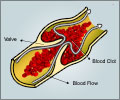Researchers have created a new drug called MPI 8 that has the potential to prevent blood clots without increasing the risk of bleeding.
- Researchers have developed a new drug, MPI 8, that could prevent blood clots without increasing the risk of bleeding, a major side effect of existing blood thinners
- The drug targets polyphosphate, a chemical involved in blood clotting that speeds up the process but is not required for it
- Early tests in mice have shown promising results, and the design platform used to create MPI 8 is flexible, potentially allowing for the development of additional compounds with similar properties and efficacy
MPI 8: Unleashing a New Era of Blood Clot Prevention
The researchers created a new drug called MPI 8 by combining their expertise in blood clotting systems and chemical synthesis. This compound has the potential to prevent blood clots without increasing the risk of bleeding, which is a major side effect of existing blood thinners. More research is needed to confirm MPI 8's safety and efficacy in humans, but preliminary findings offer hope for a new era in blood clot prevention and thrombosis treatment, as well as a testament to the power of collaboration in research medicine.Blood Clots and the Need for Safer and More Effective Blood Thinners
Blood clots are a severe health issue that affects millions of individuals worldwide. They can lead to life-threatening conditions such as deep vein thrombosis, heart attack, pulmonary embolism, and stroke if left untreated. Blood thinners, also known as anticoagulants or antithrombotic medicines, are necessary for the treatment and prevention of blood clots but come with a high risk of bleeding. This can lead to problems and limit their effectiveness in some patients.Limitations of Traditional Blood Thinners and Their Impact on Clotting
Existing blood thinners, such as heparin, direct oral anticoagulants (DOACs), and warfarin, act by inhibiting enzymes required for blood coagulation. They must, however, be carefully dosed and monitored because inhibiting those enzymes jeopardizes the normal clotting process essential to repair wounds.Targeting Polyphosphate: The Novel Approach to Inhibiting Blood Clots
Instead, UBC and Michigan researchers used a new way to target polyphosphate, a chemical involved in blood clotting that speeds up the process but is not required for it. "Our thought was that polyphosphate might be a safer target to go after with an antithrombotic drug because it would just slow these clotting reactions down-; even if we take out 100 per cent of the action of the polyphosphate," said Dr. Jim Morrissey, a professor of biological chemistry and internal medicine at the University of Michigan whose work has illuminated the role of polyphosphate in blood clotting. "We had to come up with an extremely novel way to target it compared to the usual drugs that target clotting, and that's where the expertise of Dr. Kizhakkedathu's lab became so important."Smart Drug for a Smart Target: How MPI 8 Works for Anticoagulation
The Kizhakkedathu lab zoomed in on MPI 8 after creating a library of candidate compounds and screening them for the needed parameters. This one-of-a-kind molecule has "smart" binding groups with positive charges that are pulled to the negative charge of polyphosphate. It will attach to and inhibit polyphosphate while leaving the body's other negatively charged cells and proteins alone, so avoiding hazardous side effects. MPI 8 revealed significant efficiency in avoiding blood clots in mice without raising bleeding risk in early tests. Even at large doses, the medication showed no evidence of harm.Flexible Design Platform for the Development of Novel Anticoagulants
"Not only does the drug show promise as a safer and more effective option for patients, but the design platform we used to create MPI 8 is flexible, potentially allowing for the development of additional compounds with similar properties and efficacy," said Dr. Chanel La, who worked on the project as a chemistry PhD student in the Kizhakkedathu lab. "Assuming our work continues to produce positive results, I would be very excited to get MPI 8 into an approved clinical trial and bring this drug closer to becoming a reality for patients in need."Source-Medindia
















